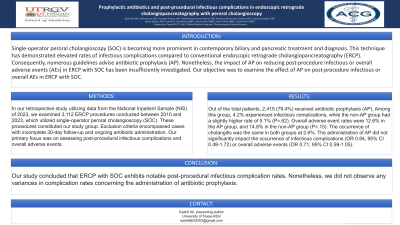Tuesday Poster Session
Category: Biliary/Pancreas
P3433 - Prophylactic Antibiotics and Post-Procedural Infectious Complications in Endoscopic Retrograde Cholangiopancreatography with Peroral Cholangioscopy
Tuesday, October 29, 2024
10:30 AM - 4:00 PM ET
Location: Exhibit Hall E

Has Audio

Kashif Ali, MD
University of Texas Rio Grande Valley
Edinburg, TX
Presenting Author(s)
Kashif Ali, MD1, Shifa Younus, MD2, Alamdar Hussain, MD3, Muhammad Hassan Cheema, MD3, Muhammad Hussnain Cheema, MD3, Usama B. Shabbir, MD4, Hamza Saleem, MD3, Humais H. Choudhary, MBBS5, Aeman Zafar, MBBS3, Noor Fatima, MBBS3, Anmol Rani, MBBS6
1University of Texas Rio Grande Valley, Edinburg, TX; 2Nishtar Medical University and Hospital, Multan, Punjab, Pakistan; 3Nishtar Medical University, Multan, Punjab, Pakistan; 4Services Institute of Medical Sciences, Lahore, Punjab, Pakistan; 5Sahiwal Medical College, Sahiwal, Punjab, Pakistan; 6Dow University of Health Sciences, Karachi, Sindh, Pakistan
Introduction: Single-operator peroral cholangioscopy (SOC) is becoming more prominent in contemporary biliary and pancreatic treatment and diagnosis. This technique has demonstrated elevated rates of infectious complications compared to conventional endoscopic retrograde cholangiopancreatography (ERCP). Consequently, numerous guidelines advise antibiotic prophylaxis (AP). Nonetheless, the impact of AP on reducing post-procedure infectious or overall adverse events (AEs) in ERCP with SOC has been insufficiently investigated. Our objective was to examine the effect of AP on post-procedure infectious or overall AEs in ERCP with SOC.
Methods: In our retrospective study utilizing data from the National Inpatient Sample (NIS) of 2023, we examined 3,112 ERCP procedures conducted between 2010 and 2023, which utilized single-operator peroral cholangioscopy (SOC). These procedures constituted our study group. Exclusion criteria encompassed cases with incomplete 30-day follow-up and ongoing antibiotic administration. Our primary focus was on assessing post-procedural infectious complications and overall adverse events.
Results: Out of the total patients, 2,415 (79.4%) received antibiotic prophylaxis (AP). Among this group, 4.2% experienced infectious complications, while the non-AP group had a slightly higher rate of 5.1% (P=.62). Overall adverse event rates were 12.6% in the AP group, and 14.8% in the non-AP group (P=.15). The occurrence of cholangitis was the same in both groups at 2.6%. The administration of AP did not significantly impact the occurrence of infectious complications (OR 0.84, 95% CI 0.48-1.72) or overall adverse events (OR 0.71, 95% CI 0.59-1.05).
Discussion: Our study concluded that ERCP with SOC exhibits notable post-procedural infectious complication rates. Nonetheless, we did not observe any variances in complication rates concerning the administration of antibiotic prophylaxis.
Disclosures:
Kashif Ali, MD1, Shifa Younus, MD2, Alamdar Hussain, MD3, Muhammad Hassan Cheema, MD3, Muhammad Hussnain Cheema, MD3, Usama B. Shabbir, MD4, Hamza Saleem, MD3, Humais H. Choudhary, MBBS5, Aeman Zafar, MBBS3, Noor Fatima, MBBS3, Anmol Rani, MBBS6. P3433 - Prophylactic Antibiotics and Post-Procedural Infectious Complications in Endoscopic Retrograde Cholangiopancreatography with Peroral Cholangioscopy, ACG 2024 Annual Scientific Meeting Abstracts. Philadelphia, PA: American College of Gastroenterology.
1University of Texas Rio Grande Valley, Edinburg, TX; 2Nishtar Medical University and Hospital, Multan, Punjab, Pakistan; 3Nishtar Medical University, Multan, Punjab, Pakistan; 4Services Institute of Medical Sciences, Lahore, Punjab, Pakistan; 5Sahiwal Medical College, Sahiwal, Punjab, Pakistan; 6Dow University of Health Sciences, Karachi, Sindh, Pakistan
Introduction: Single-operator peroral cholangioscopy (SOC) is becoming more prominent in contemporary biliary and pancreatic treatment and diagnosis. This technique has demonstrated elevated rates of infectious complications compared to conventional endoscopic retrograde cholangiopancreatography (ERCP). Consequently, numerous guidelines advise antibiotic prophylaxis (AP). Nonetheless, the impact of AP on reducing post-procedure infectious or overall adverse events (AEs) in ERCP with SOC has been insufficiently investigated. Our objective was to examine the effect of AP on post-procedure infectious or overall AEs in ERCP with SOC.
Methods: In our retrospective study utilizing data from the National Inpatient Sample (NIS) of 2023, we examined 3,112 ERCP procedures conducted between 2010 and 2023, which utilized single-operator peroral cholangioscopy (SOC). These procedures constituted our study group. Exclusion criteria encompassed cases with incomplete 30-day follow-up and ongoing antibiotic administration. Our primary focus was on assessing post-procedural infectious complications and overall adverse events.
Results: Out of the total patients, 2,415 (79.4%) received antibiotic prophylaxis (AP). Among this group, 4.2% experienced infectious complications, while the non-AP group had a slightly higher rate of 5.1% (P=.62). Overall adverse event rates were 12.6% in the AP group, and 14.8% in the non-AP group (P=.15). The occurrence of cholangitis was the same in both groups at 2.6%. The administration of AP did not significantly impact the occurrence of infectious complications (OR 0.84, 95% CI 0.48-1.72) or overall adverse events (OR 0.71, 95% CI 0.59-1.05).
Discussion: Our study concluded that ERCP with SOC exhibits notable post-procedural infectious complication rates. Nonetheless, we did not observe any variances in complication rates concerning the administration of antibiotic prophylaxis.
Disclosures:
Kashif Ali indicated no relevant financial relationships.
Shifa Younus indicated no relevant financial relationships.
Alamdar Hussain indicated no relevant financial relationships.
Muhammad Hassan Cheema indicated no relevant financial relationships.
Muhammad Hussnain Cheema indicated no relevant financial relationships.
Usama Shabbir indicated no relevant financial relationships.
Hamza Saleem indicated no relevant financial relationships.
Humais Choudhary indicated no relevant financial relationships.
Aeman Zafar indicated no relevant financial relationships.
Noor Fatima indicated no relevant financial relationships.
Anmol Rani indicated no relevant financial relationships.
Kashif Ali, MD1, Shifa Younus, MD2, Alamdar Hussain, MD3, Muhammad Hassan Cheema, MD3, Muhammad Hussnain Cheema, MD3, Usama B. Shabbir, MD4, Hamza Saleem, MD3, Humais H. Choudhary, MBBS5, Aeman Zafar, MBBS3, Noor Fatima, MBBS3, Anmol Rani, MBBS6. P3433 - Prophylactic Antibiotics and Post-Procedural Infectious Complications in Endoscopic Retrograde Cholangiopancreatography with Peroral Cholangioscopy, ACG 2024 Annual Scientific Meeting Abstracts. Philadelphia, PA: American College of Gastroenterology.
